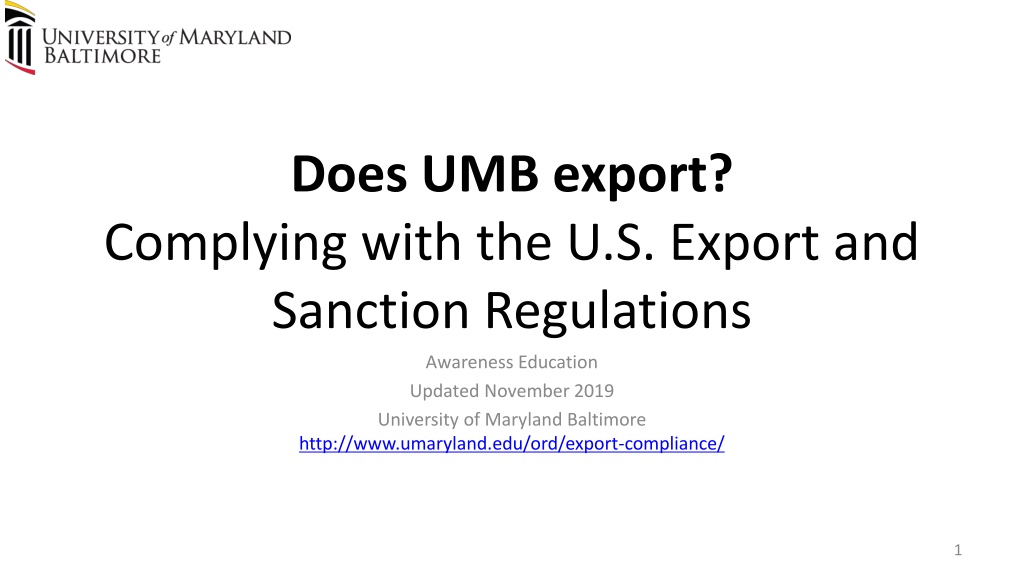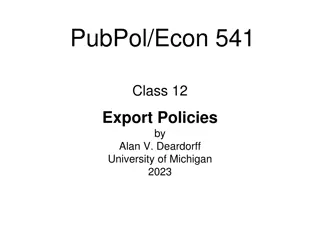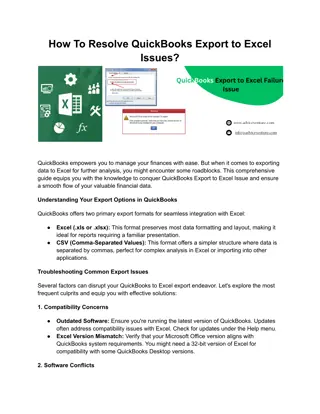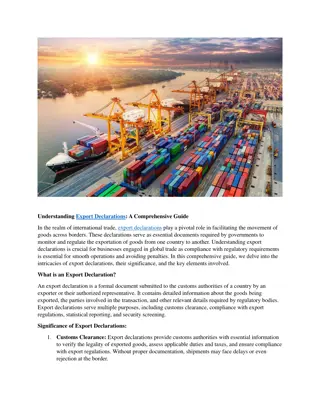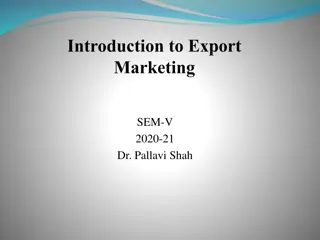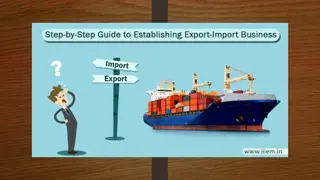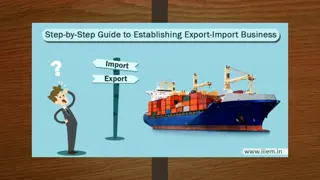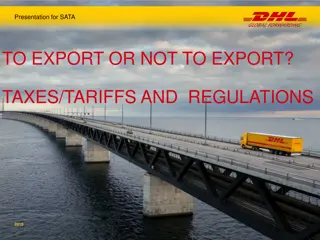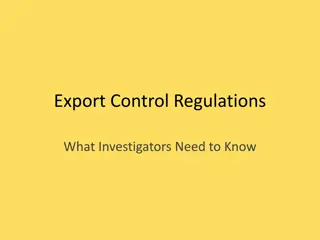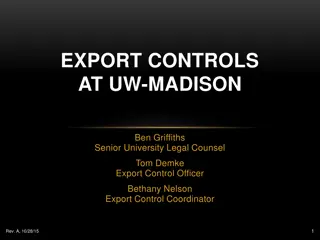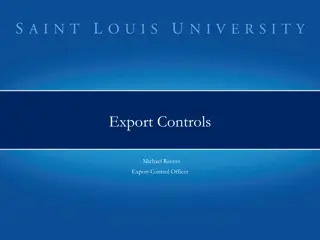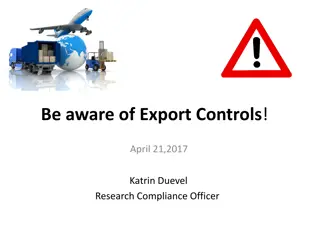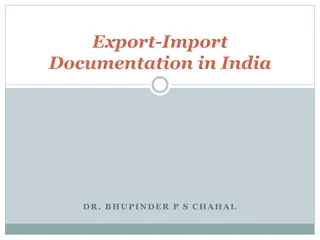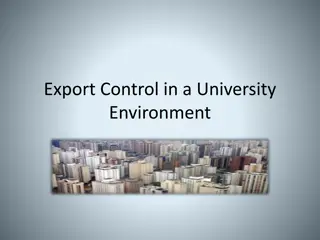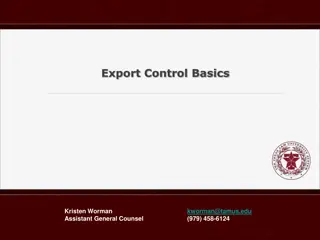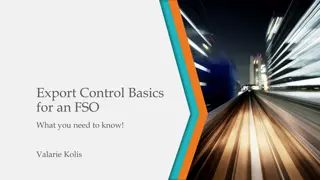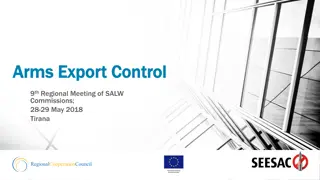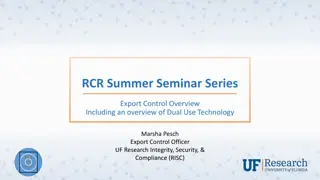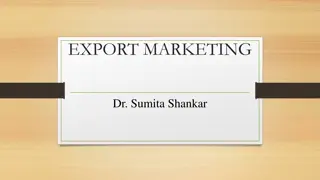Understanding U.S. Export Control Regulations
U.S. export control regulations are crucial for national security, foreign policy, and economic interests. This includes governing the export of strategic technologies, equipment, hardware, software, and the provision of technical assistance to foreign persons. The regulations aim to prevent the unauthorized export of certain technologies deemed important for national security reasons such as nuclear non-proliferation, missile technology controls, anti-terrorism measures, and more. Understanding who falls under the category of a foreign person and what constitutes an export is essential for compliance with these regulations.
Download Presentation

Please find below an Image/Link to download the presentation.
The content on the website is provided AS IS for your information and personal use only. It may not be sold, licensed, or shared on other websites without obtaining consent from the author. Download presentation by click this link. If you encounter any issues during the download, it is possible that the publisher has removed the file from their server.
E N D
Presentation Transcript
Does UMB export? Complying with the U.S. Export and Sanction Regulations Awareness Education Updated November 2019 University of Maryland Baltimore http://www.umaryland.edu/ord/export-compliance/ 1
Why does the government control exports? The U.S. government controls certain technologies that it considers to be strategically important for: National Security Reasons Nuclear Non-Proliferation Reasons Missile Technology Controls Anti-Terrorism Chemical & Biological Controls Regional Stability Crime Control Measures Anti-boycott Reasons 2
U.S. Export Control Regulations Are designed to advance national security, foreign policy and economic interests of the United States Govern the export of strategic technologies, equipment, hardware, software or providing technical assistance to Foreign Persons. 3
Who is a Foreign Person? 1. Any person who is NOT a: U.S. citizen U.S. Permanent Resident (Green Card holder) Person who has been granted political asylum by the U.S. 2. Any foreign corporation, entity, partnership or group that is not incorporated or organized to do business in the U.S. 3. Any foreign government 4. Individuals (including U.S. citizens) who represent a foreign government or foreign entity 4
Export includes Things, information, services Either within the U.S. or abroad 5
Export examples Transmission of material goods Items shipped out of the U.S. Items hand-carried (laptop, memory devices) out of the U.S. Use of controlled materials by a foreign person Use or application of controlled technology on behalf of, or for the benefit of, any foreign person or entity Dissemination of research data and information to a foreign person Email Website Face-to-face Visual inspection that reveals controlled technical data Conference 6
Export without crossing borders Deemed Export In its simplest terms, a Deemed Export can be defined as (1) the release (2) of technology or source code (3) having both military and civilian applications (4) to a foreign national (5) within the United States. Thus, even though the release in question takes place within the confines of the United States, the transaction is deemed to be an export and therefore subject to certain United States Government export control regulations. The logic is that knowledge transferred to an individual within the United States can readily be transported abroad should the recipient wish to do so. --The Deemed Export Rule in an Era of Globalization, December 20, 2007, report to the U.S. Secretary of Commerce 7
Controlled Technology and Transactions U.S. Export Control Regulations define controlled technologies, items, information, services The regulations include exceptions, exclusions, general licenses and authorizations The regulations identify countries, entities and persons that are prohibited or restricted from certain exports, transactions, or services 8
How do we know what is controlled? 9
Details What we need to know to determine control and licensing requirements: Who will receive services, information, technology or technical data (individuals and entities)? What is the destination country? Who will benefit from services provided? What is the end use of the item? What information, technology or technical data is involved? Is it controlled? 10
Analysis of the Details Legal and technical analyses determine whether a technology/transaction is controlled Scientific/technical analysis of the regulations determines whether the item under review meets the detailed specifications for control Legal analysis of the regulations determines whether an exception, exclusion, general license, or authorization is available for the transaction or if a specific license or authorization will need to be sought. 11
Investigator Roles Identify export red flags in your programs (science, services, trainings, collaborations) Work with administrators in processing foreign national employees and visitors/volunteers provide description of research or other activities; complete the deemed export control form Never accept publication restrictions, even off the record 12
Implementing UMBs Policy The following slides describe The three key sets of U.S. export regulations Exclusions from the export regulations (and how the exclusions can be negated) Red flags UMB review procedures 13
Three agencies Three sets of regulations Treasury Department Commerce Department State Department Office of Foreign Assets Control (OFAC) Bureau of Industry and Security (BIS) Directorate of Defense Trade Controls (DDTC) Foreign Assets Control Regulations Export Administration Regulations (EAR) International Traffic in Arms Regulations (ITAR) Sanction Programs Commerce Control List (CCL) United States Munitions List (USML) Prohibits transactions with countries, entities and persons subject to boycotts, trade sanctions and embargoes Exports and re-exports of commodities, software, equipment and technology including dual-use (civil and military) items Transfers of defense articles and provision of defense services; inherently military technologies 14
Sanctions and Restricted Parties The U.S. government applies economic boycotts, trade embargoes or other actions against specific countries, regimes, and/or specific activities (such as terrorism or trafficking) Primarily administered by the Department of the Treasury, Office of Foreign Assets Control (OFAC) The Departments of State, Commerce and Treasury maintain lists of persons (individuals and entities) denied export privileges and/or barred from financial and other transactions for reasons related to U.S. security, foreign policy or economics https://www.treasury.gov/resource-center/sanctions/SDN-List/Pages/consolidated.aspx NOTE: View slides in PLAY mode to access live (blue) links. 15
Sanctioned countries http://www.treasury.gov/resource-center/sanctions/Programs/Pages/Programs.aspx https://www.bis.doc.gov/index.php/policy-guidance/country-guidance Sanctions change frequently - check the regulations for latest restrictions affecting countries and parties with which you plan to do business. OFAC countries of highest concern (comprehensive sanctions of services and transactions) Cuba Iran North Korea Russia Syria Ukraine EAR countries of highest concern (sharing of tangible goods or non- fundamental research results) Cuba Iran Iraq North Korea Sudan Syria As of October 2019
Categories of Sanctions Comprehensive Sanctions:Generally prohibit all imports and exports of materials, financial transactions of any kind, and/or providing services of any kind. Transactions will require a specific license or exemption from OFAC before any transaction can take place. Limited Sanctions: Block specific practices. Most research and business activities may be conducted without an OFAC special license, so long as specific criteria are met as outlined in the regulations for a General License. Regime or List-Based Sanctions: Blocks specific property of targeted foreign governments, regimes, supporters and persons that are not necessarily country- specific, but which may be owned, controlled by, or acting for or on behalf of, targeted countries or entities as a front organization. 17
ITAR Department of State: Arms Export Control Act International Traffic in Arms Regulations (ITAR) Covers commodities and technologies with a predominantly military use or space application U.S. Munitions List - 22 CFR Part 121 Examples: certain biological agents, vaccines, and medical countermeasures, especially if developed or produced under a Department of Defense contract or other funding authorization https://www.pmddtc.state.gov/ddtc_public?id=ddtc_kb_article_page&sys_id =%2024d528fddbfc930044f9ff621f961987 18
EAR Department of Commerce: Export Administration Act Export Administration Regulations (EAR) Covers commercial technologies Covers dual use technologies (i.e., civil + military applications) Commerce Control List - 15 CFR Part 774 Examples: computers, software, sensors, lasers, toxins, pathogens, night vision goggles or cameras http://www.bis.doc.gov/index.php/regulations/export-administration- regulations-ear 19
How UMB exports: Global collaborations, international sponsors, foreign subrecipients, foreign consultants, international travel Deemed export (see slide 7): Foreign persons on campus (visiting scientists, employees on work visas, students) Most UMB export concerns relate to country sanctions Export laws apply regardless of funding source 21
University policy on export controls UMB and its personnel must comply with applicable laws and regulations governing Export Controls and Sanctions. UMB Personnel must comply with the provisions of any license, conditions of any other government approval, policy or UMB directed certification, technology control plan, or procedure if an export, activity, or transaction is subject to Export Controls and Sanctions. http://www.umaryland.edu/policies-and- procedures/library/research/policies/iv-9900a.php 22
UMB is a Fundamental Research university UMB (and many other U.S. institutions) rely on the fundamental research exclusion for international collaborations on campus http://www.umaryland.edu/ord/export-compliance/fundamental-research/ 23
What is Fundamental Research? Fundamental research (defined in EAR and ITAR) is: basic and applied research in science and engineering at accredited institutions of higher learning in the U.S. where the resulting information is ordinarily published and shared broadly in the scientific community Applies to research performed on campus here in the U.S. that has no restrictions on publication or dissemination of the research results 24
Fundamental Research Exclusion Research data and information resulting from fundamental research is excluded from (not subject to) EAR or ITAR Does not cover: Exports of hardware, software and technology (tangible items) Encryption software Research where there is no intention to publish the results Research conducted outside of the United States Project work that is not research (services, training) OFAC or other sanctions/embargoes may still apply 25
UMB and Export Compliance By policy, UMB does not accept on-campus research that includes restrictions on publication A reasonable delay of publication to protect patentable subject matter is not considered a restriction Thus, most research at UMB is not subject to EAR or ITAR But, UMB must still comply with OFAC sanctions and watch for other red flags 26
Protecting the Fundamental Research Exclusion (FRE) Research must be intended for publication. Terms that require approval or consent to publish negate the FRE and are in conflict with University policy. A side agreement that agrees to publication restrictions negates the FRE (examples: correspondence between PI and sponsor; confidentiality agreement with publication restriction) 27
Protecting the FRE Participation restrictions Terms that restrict participation of foreign nationals in the project may negate the FRE and they limit your ability to assign students, fellows, staff and investigators to the project without sponsor approval Accepting export-controlled material or information from a sponsor or collaborator Agreement terms should require the provider to identify export- controlled information/material and allow UMB and its investigator to decline receipt and/or modify UMB s research to remain fundamental 28
DURC The fundamental research exclusion may be lost if research is identified as Dual Use Research of Concern (DURC) http://www.umaryland.edu/ehs/programs/biosafety/dual-use- research-of-concern-durc/ 29
Other Exclusions from Export Controls Other exclusions from the EAR and ITAR that may lead to a determination that the research or transaction is not subject to export controls: Public domain/publicly available information Full-time employee Educational information/registered students Definitions and limitations are described in the EAR and ITAR. http://www.umaryland.edu/ord/export-compliance/fundamental- research/other-exclusions/ 30
Export Red Flags Red flags identify items for further review and due diligence Restrictive terms in agreements (publication or participation) Work done abroad Sending abroad materials or equipment Sending, transmitting or disclosing to a sanctioned country (or citizens of those countries) or a person or organization on the restricted party lists Ultimate destination or use unknown (you send item/info overseas and the recipient sends it to someone else) http://www.umaryland.edu/procedures/research/sponsored-projects/export-controls-checklist.php 31
How do I comply with U.S. Export Controls? * Know and recognize red flags * Determine what technologies/information in your work may be controlled See Dig Deeper (slide 51 and following) * Ask for restricted party screening for foreign persons, whether in your lab or overseas * Ask for advice before you export covered technology 32
Export Compliance Reviews at UMB UMB export officers use a subscription software tool for screening foreign persons (entities and individuals) against restricted party lists and country sanctions, and to initiate license review for potentially controlled items. Restricted party screening PI or administrator will be contacted for more information if required (to eliminate false hits) Project/technology-related questions, e.g., research, training or service details or equipment/software to be used PI will be contacted for more information if required 34
Analysis of potential issues Does an exclusion, exemption, general license, or authorization allow the transaction? If yes, the determination is documented and the PI is informed of any conditions or restrictions If no, then UMB s export officers work with the PI to decide whether or not to request a license or other authorization from the regulating agency. If a specific license or authorization is needed: the timetable for agency response and obtaining a license or authorization is weeks to months, with no guarantee that the request will be granted. Be prepared for a plan B . 35
Key Export Compliance Reviews at UMB Deemed export review and I-129 visa petition export control certifications for foreign national employees Foreign national visiting scientists and scholars Subawards, consultant agreements, material transfer agreements for non- U.S. entities/persons Review of awards with overseas project work (on a risk basis) 36
Other available reviews (performed on request or as spot-checks) Potential issues at the proposal stage International travel International shipping Restricted party screening may be requested for any transaction with foreign individuals or entities, e.g., international conference attendees on campus, overseas wire transfer not associated with a subaward, foreign national consultants, etc. 37
Deemed Export Control review Submit the Deemed Export Control Form for review of all foreign national employees on work visas including H-1B, paid J-1, F-1 OPT, etc. Included with HR and Office of International Services packets http://www.umaryland.edu/media/umb/ord/documents/DEForm-rev-Aug2016.pdf http://www.umaryland.edu/ord/export-compliance/procedures/deemed-exports/ 38
Visiting scientists/scholars http://www.umaryland.edu/ord/export-compliance/procedures/international-visitors/ Export review includes restricted party screening of visitor and their home organization (if any) and review of proposed activities at UMB Visiting scientist agreement required Visitors/Volunteers who are not paid by UMB and who will have independent access to facilities (i.e., a UMB One Card) must sign a Visiting Scientist Agreement Protects UMB and PI with terms addressing intellectual property, confidentiality, other issues 39
Subawards Export control review usually occurs after the department submits a Subaward Request naming a foreign subrecipient Export officer reviews the scope of work and screens organization, subrecipient PI and other key individuals against the restricted party lists http://www.umaryland.edu/ord/export-compliance/procedures/international- subrecipients/ 40
Other reviews Proposal development: Proposals to flag for review should include: Proposals involving known sanctioned countries Proposals potentially involving a Defense Article or Defense Service (defined on the next two slides) International MOUs, teaming agreements and affiliation agreements should always be reviewed. http://www.umaryland.edu/spa/developing-proposals/projects-with-international- components/mous-for-international-initiatives/ Contact jsimons@umaryland.edu to initiate review. 41
Defense article defined: Defense Article: 22 CFR 120.6 Any item or technical data (defined on next slide) listed on the United Stated Munitions List (USML) (22 CFR 121.1), including technical data recorded or stored in any physical form, models, mockups or other items that reveal technical data directly relating to items on the USML. It does not include basic marketing information on function or purpose or general system descriptions. Defense Articles listed in the USML include weapons, ammunition, vehicles, explosives, military training and equipment, personal protective equipment, certain lasers, infrared cameras and other detection equipment/devices, certain chemical agents, biological agents and nerve agents. The USML also defines certain items funded specifically by the Department of Defense as Defense Articles. The detailed specifications in the USML must be reviewed carefully. The determination for inclusion on the U.S. Munitions List is guided by the following criteria: specifically designed, developed, configured, adapted, or modified for a military application, does not have predominant civil applications, and does not have performance equivalent (defined by form, fit and function) to those of an article or service used for civil applications; 42
Defense service defined Defense Service: 22 CFR The furnishing of assistance (including training) to foreign persons, whether in the U.S. or abroad in the design, development, engineering, manufacture, production, assembly, testing, repair, maintenance, modification, operation, demilitarization, destruction, processing or use of Defense Articles; The furnishing to foreign persons of any technical data (as defined in 120.10), whether in the United States or abroad; or Military training of foreign units and forces including formal or informal instruction of foreign persons in the U.S. or abroad or by correspondence courses, technical, educational, or information publications and media of all kinds, training aid, orientation, training exercise, and military advice. 120.9 Technical data: 22 CFR Information other than software which is required for the design, development, production, manufacture, assembly, operation, repair, testing, maintenance, or modification of Defense Articles, and classified information relating to Defense Articles and Defense Services on the USML and 600-series items controlled by the [EAR] Commerce Control List Software directly related to Defense Articles NOT information concerning general scientific, mathematical or engineering principles commonly taught in schools, colleges and universities or information in the public domain (i.e., public domain and fundamental research exclusions as defined in 22 CFR 120.11) 120.10 22 CFR 120.3 (Note): The intended use of the article or service after its export (i.e., for a military or civilian purpose), by itself, is not a factor in determining whether the article or service is subject to the controls of this subchapter [ITAR controls]. 43
International travel http://www.umaryland.edu/ord/export-compliance/procedures/international- travel/ International travel to meetings or for other scientific exchange is generally exempt from export controls UNLESS the findings to be presented include detailed information regarding controlled items or technologies, or research identified as DURC. Research or educational activities (including conference attendance or presentation) are restricted in sanctioned countries. Taking UMB-owned equipment out of the country? Some equipment (e.g., GPS, specialty software) may require a license. 44
Global travel and technology 1 Take security precautions when visiting sensitive countries/areas (Middle East, China, Russia, and others). Recommendations for highest security include: Use clean laptops or other IT devices when available; Ensure systems are updated with the most recent security and malware definition files prior to travel; Remove all unnecessary UMB data and/or personal data from laptops or electronic devices before taking such devices overseas (only what you need to complete the reason for your visit). If you cannot afford to lose it, or if the loss of the information or data would create financial or reputational risk to the University, leave it at home; Remove ALL third-party proprietary, confidential, or sensitive data and all export controlled data and materials from any electronic devices prior to travel; Remove any encrypted files and encryption capable software, other than system critical or software support encryption technologies (for instance, built-in Windows encryption resources). Encryption technologies are strictly controlled for entry and exit from countries such as China; Do not use any Wi-Fi connections from unknown third-party providers/sources; Always use VPN back into UMB systems; note that China prohibits use of VPN unless specifically approved for use Refrain from use of publicly available Wi-Fi connections if possible, even if labeled as secure and/or requiring passwords for use, as these connection points are often subject to intrusion software risks such as keystroke loggers; To the extent possible, keep laptops/devices in your personal possession at all times. Never accept or attach unknown devices or drives (including flash/USB drives) as malicious code may be installed on such devices at any time, including at manufacture or after; and, Have your electronic devices scanned for malware upon return prior to connection to the UMB network. Source: Pennsylvania State University, edited 45
Global travel and technology 2 In most countries, you have no expectation of privacy in internet cafes, hotels, offices, or public places. In some countries, hotel rooms are often searched. All information you send electronically no matter the method can be intercepted. Security services and criminals can track your movements using your mobile computing/electronic device and can even turn on the microphone in your computing/electronic device when you think that it s off. Security services and criminals can insert malicious software into your computing/electronic device through any connection that they control. When connecting to your home or University systems or networks, this malware can be transmitted back to these systems as well. Transmitting sensitive information from abroad is risky. If your mobile computing/electronic device is examined, or if your hotel room is searched while you are not present, you should assume that your device s data has been copied and/or compromised. Source: Pennsylvania State University, edited 46
Global travel and anti-bribery regulations Foreign Corrupt Practices Act Unlawful for a U.S. person, including UMB and its personnel, to bribe a foreign official for the purpose of obtaining or retaining business, or to otherwise securing an improper advantage Bribes include money, favors, and other inducements More information and training: http://www.umaryland.edu/ord/export-compliance/foreign- corrupt-practices-act/ 47
Shipping Be aware of the requirements for proper labeling and marking. Shipping tangible items outside of the United States usually requires an export license determination to correctly complete the shipping documentation. Contact Environmental Health and Safety for information and training. 48
UMB Export Officers Office of Research and Development Janet Simons, Director, Research Policy 410-706-5632 jsimons@umaryland.edu Environmental Health and Safety Melissa Morland, Biosafety Officer 410-706-7845 mmorland@umaryland.edu 49
More information http://www.umaryland.edu/ord/export-compliance/ 50
